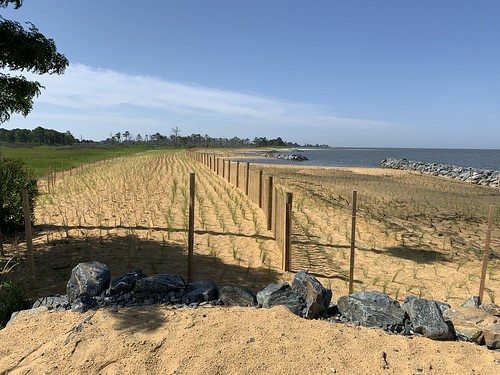Maryland Awards $3 Million in Climate Resilience Grants to 13 Community Projects

Deal Island’s living shoreline and marsh enhancement work was supported by a past climate resilience grant. Photo by Nicole Carlozo, Maryland Department of Natural Resources.
The Maryland Department of Natural Resources today announced the award of more than $3 million in competitive grants for 13 climate resilience projects. The grants will help communities design and construct solutions to withstand flooding and other weather-related events.
The projects selected will reduce risk for vulnerable communities, incorporate climate change data and information into existing plans and policies, and develop nature-based or natural solutions to help control flooding.
Funding is provided by the state’s Resiliency Through Restoration Initiative, the U.S. Environmental Protection Agency, and the National Oceanic and Atmospheric Administration.
Grant funding for Fiscal Year 2024 is awarded to the following local governments and community partners, pending final approval by federal partners:
Allegany County
- Trout Unlimited – To construct a stream restoration project at Sand Spring Run Stream with riparian buffer plantings to reconnect the floodplain and stabilize eroding stream banks.
Anne Arundel County
- Arundel Rivers Federation – To construct a living shoreline along the Hillsmere Sand Spit and install conservation plantings to increase climate resilience of a community marina.
- Green Trust Alliance – To replace a dilapidated bulkhead with a living shoreline to protect community infrastructure.
- Empowering Believers Church, Anne Arundel County – To design green infrastructure practices with removal of impervious surfaces to reduce stormwater flooding on church property.
- The Key School, Anne Arundel County – To design and construct three bioretention practices to address stormwater flooding on school fields and erosion of the adjacent community shoreline.
Baltimore City
- Blue Water Baltimore, Baltimore City – To construct a bioretention and rain garden on Ascension St. Agnes Hospital’s campus to treat stormwater runoff and address local flooding in West Baltimore
- Violetville United Methodist Church, Baltimore City – To design green infrastructure practices on church property to reduce stormwater flooding and increase community climate resilience.
Cecil County
- Town of Charlestown, Cecil County – To complete a comprehensive plan update that weaves resilience strategies for water resources, sensitive areas, land use, and municipal growth to address the environmental, social, and economic impacts of climate change.
- Town of Perryville, Cecil County – To develop a master plan for Ice House Park, assess flood and stormwater impacts, and propose green infrastructure solutions that balance public use with habitat and flood reduction benefits.
- Town of Elkton, Cecil County – To complete a watershed and flood analysis to identify and prioritize flood control projects along Big Elk Creek.
- West View Shores Civic Association, Cecil County – To design a living shoreline with stone headland, dune and migration corridor features along community open space to reduce shoreline erosion and increase community climate resilience.
Prince George’s County
- City of Greenbelt, Prince George’s County – To develop a Community Flood Resilience Plan to guide policy and future projects.
Talbot County
- Tilghman Island, Talbot County – To construct a 975-linear-foot living shoreline and upland stormwater practices with oyster, marsh migration, dune, wetland, and meadow components to enhance resilience.
Applications for this funding are accessed through the department’s Grants Gateway to provide a single entry point for grantees, and ensure access to funding for innovative, local projects. Through improved connections across similar grant programs, the department will support more comprehensive and integrated projects that achieve at least one of the following outcomes: fostering healthy ecosystems, building resiliency, or providing outdoor learning experiences.

 1-888-373-7888
1-888-373-7888 233733
233733